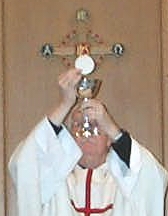





|
Thorny issues facing the church today...
Contents
- Ecumenism:
- I believe the Anglican church has a unique character which God has called into being, and which no other denomination expresses in quite the same way. This includes flexibility, a respect for liturgy, and a delicate balance between apostolic leadership and the shared authority of the whole people of God.
- However, the failure of the worldwide Christian church to lower barriers between denominations is nothing short of sinful. Christ calls the church to be One - even though individuals, congregations, and clusters of Christians might have distinctive characters.
- Almost all ecumenism is hard work - for contacts between bishops, between clergy, and between organizations, force us out of our natural lines of communication and routine. But all such contacts are important, and must be attempted. Joint worship and joint projects between denominations - difficult though they may be, both to get off the ground and to sustain - are a high priority with me.
- Sexual Orientation:
- I believe the church must carefully consider whether or not homosexual orientation is a natural, and potentially joyful condition. If the Canadian church in General Synod formally authorises it, I will support - and preside at, if requested - liturgical celebrations for monogamous same-sex unions, provided such a decision by General Synod does not precipitate the fracture of the Anglican Communion (see next entry, “Schism”).
- Schism in the Anglican Communion:
- I believe that the breaking of the church – fracturing the Body of Christ – for whatever cause, is a grievous evil. Should a part of our worldwide Anglican fellowship, the Anglican Communion, formally disengage or declare itself out of Communion with another part – and there is a real possibility this might happen over the issue of same-sex normalization – I would be forced against my will to try to select a church which to my mind most closely approximates the Unity for which Jesus prayed in the Gospel of John (John 17:11-22). Such a church may be one of the remaining fragments of the Anglican Communion following such a rupture, but it might not be Anglican at all.
- Christian Initiation:
- I support administering Communion to all who are Baptised, including small children (though I prefer children to have some cognitive response). Though I do not see Confirmation as a necessary prelude to receiving Communion, I support retaining it as a distinct Episcopal rite.
- Money in the church:
- I believe God expects all of us, both ordained and lay, to freely offer 10% of our Time, our Talent, and our Treasure to the work of the Kingdom of Heaven. In the case of church employees a financial tithe is not to be seen as a rebate on salary, rather church personnel must be free to offer their gifts of money anywhere they choose in the Body of Christ.

- Total Ministry:
- I expect that many of the practices traditionally associated with the clergy should be taken on by those who are not ordained and who have the appropriate spiritual gifts: visiting the sick, for example, or parish administration, or Baptism and Confirmation preparation, or preaching, to name only a few. This should be the case in both wealthy urban parishes and struggling remote ones. Where it is impossible to provide regular access to the leadership of professional clergy, I support the ordination of locally raised candidates. I believe, however, that ordination is for life, and therefore such candidates must be very carefully selected, and supported over the years both by the diocese and by fellow parishioners. As well, there should be a condition on their licence which limits their eligibility to become the “incumbent” of any parish.
- Abortion:
- I believe the act of abortion kills a human being. As such it is an evil. There are times, however, when abortion is the lesser of two evils, and therefore to be preferred.
- Feminism/inclusive language:
- I claim some credentials as a feminist: of the candidates for ordination from parishes where I have been incumbent, two have been male and four female. I have chosen three full-time clergy assistants, two female and one male. In my personal life I have been a male “single parent” and presently cook, shop, and vacuum so that my lawyer-spouse may be able to focus on her profession. She has never taken my surname, and in some circles I delight to be known as “Mr.Dixon.” I never say “men” when I mean “people,” and I do not say “mankind.” However, I will continue to preach and to speak “...in the Name of the Father, Son, and Holy Spirit.” These titles have an historic and scriptural meaning for which satisfactory alternative terms have yet to be found.
Click here to return to any section:
|

